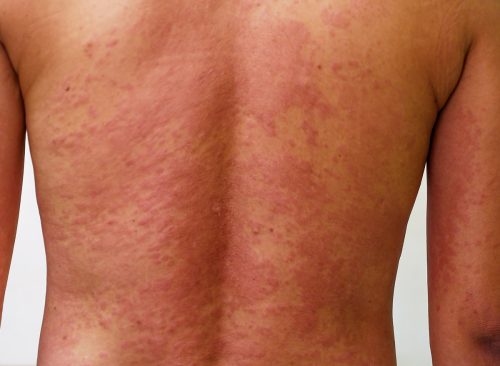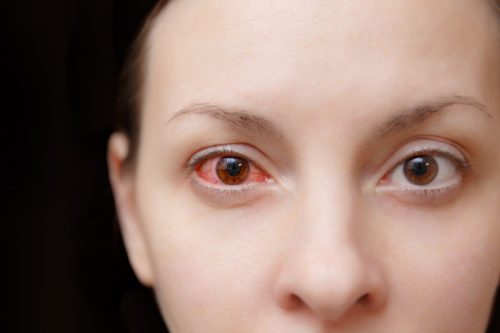
More than 1,200 people are dying of COVID in America weekly, as only 7% of adults and 2% of children have gotten the latest vaccine. “That’s a travesty,” Dr. David Kimberlin, a pediatrician at the University of Alabama at Birmingham who represented the American Academy of Pediatrics during a survey presented on Thursday to scientific advisers to the Centers for Disease Control and Prevention, told the New York Times. “It’s like an entire neighborhood being wiped out every single week.” By now, you probably know the most common symptoms: Fever or chills; cough; shortness of breath or difficulty breathing; fatigue; muscle or body aches; headache; new loss of taste or smell; sore throat; congestion or runny nose; nausea or vomiting; diarrhea.
But read on to learn about the rarer but still essential symptoms.

COVID toes, also known as pernio-like lesions, manifest as red or purple swellings on the toes or fingers. These lesions may appear painful, itchy, or even blistered. They are often a result of inflammation in small blood vessels beneath the skin and can resemble chilblains or frostbite. While this symptom primarily affects the extremities, it’s crucial to note that not everyone with COVID-19 will develop COVID toes.

COVID-19 rashes can present in various forms, including hives (urticaria) or mottled skin. These rashes often appear suddenly and can affect the trunk, limbs, or other body parts. Some individuals may experience localized redness and itching, while others may notice patchy or discolored skin.

COVID-19 can cause conjunctivitis, also known as “pink eye.” Symptoms include redness, irritation, excessive tearing, and a gritty feeling in one or both eyes. Eye pain and sensitivity to light (photophobia) may also be present.

COVID-19 brain fog is characterized by persistent cognitive difficulties. This includes trouble concentrating, memory lapses, and difficulty making decisions. Even individuals without a history of cognitive issues may experience these symptoms.

COVID-19 can lead to ear-related symptoms such as sudden hearing loss, ringing in the ears (tinnitus), or episodes of dizziness (vertigo). These symptoms may occur alone or in combination with other COVID-19 manifestations.

Gastrointestinal (GI) symptoms associated with COVID-19 include persistent nausea, vomiting, diarrhea, or abdominal discomfort. These symptoms may appear alongside respiratory issues or as isolated complaints.

COVID-19 can cause joint pain, known as arthralgia, or muscle aches. These discomforts may be mistaken for other conditions or attributed to physical exertion.

COVID-19-related chest pain often presents as sharp or stabbing discomfort that worsens with breathing or coughing. This pain may be alarming, as it can mimic symptoms of heart or lung issues.
RELATED: 90% of People Who Die From COVID Have This in Common

COVID-19 can lead to sudden hoarseness or a complete loss of voice. These vocal changes may occur abruptly and without any apparent cause.














